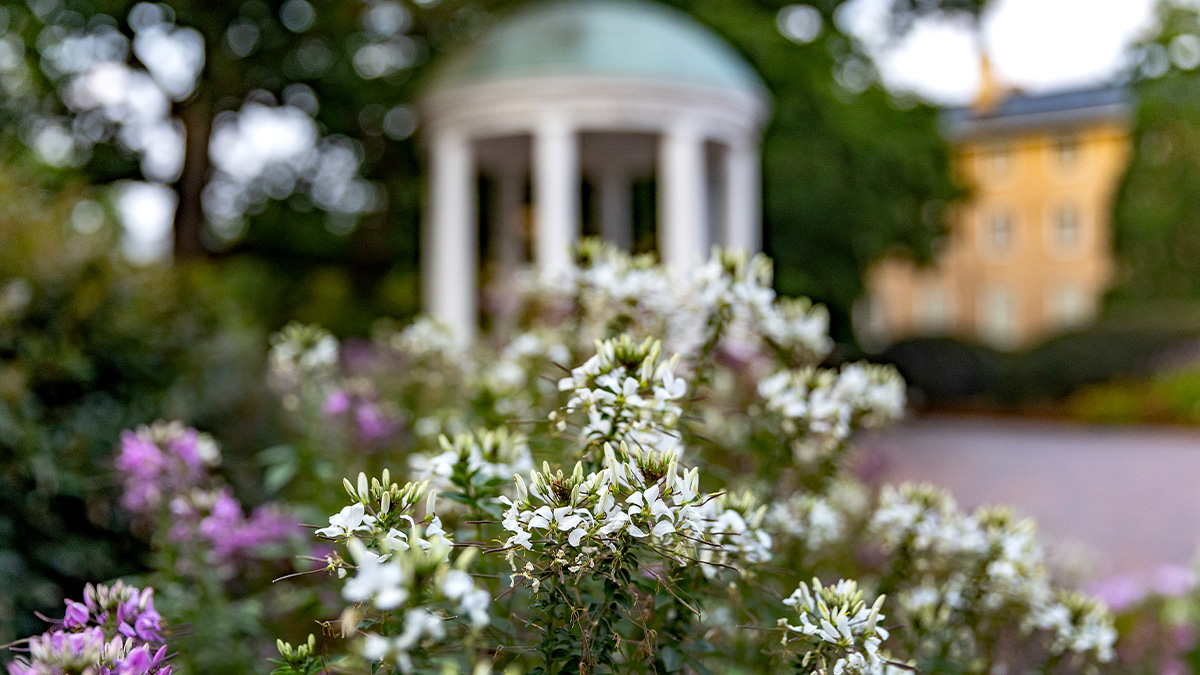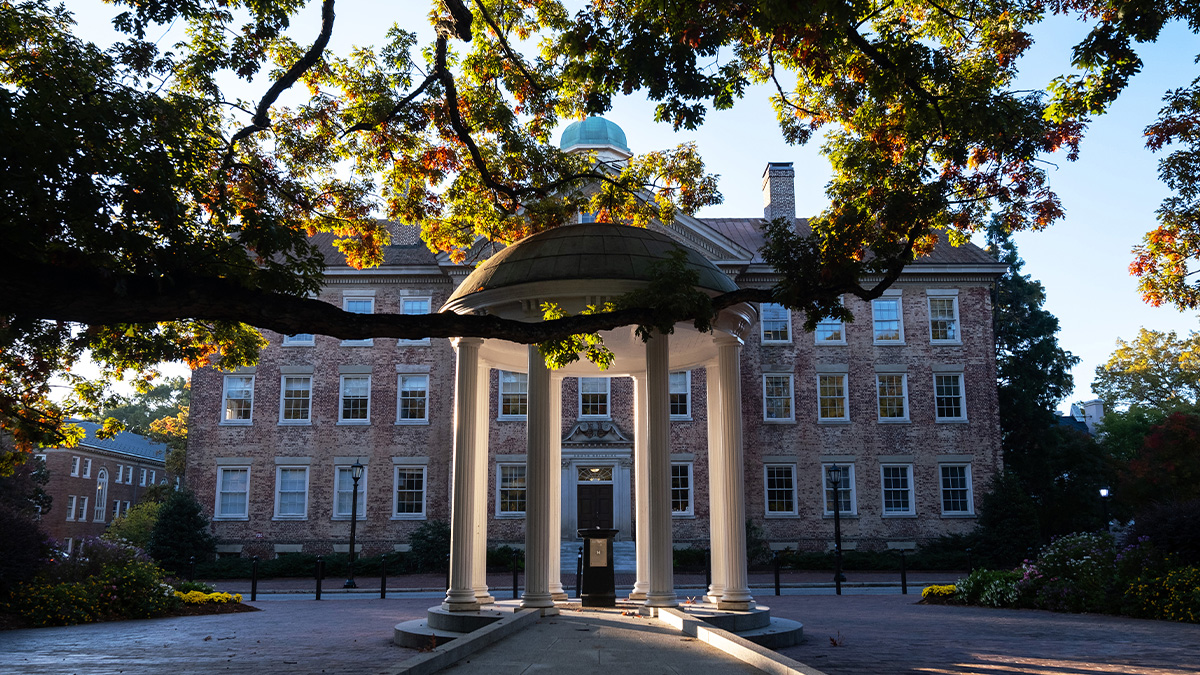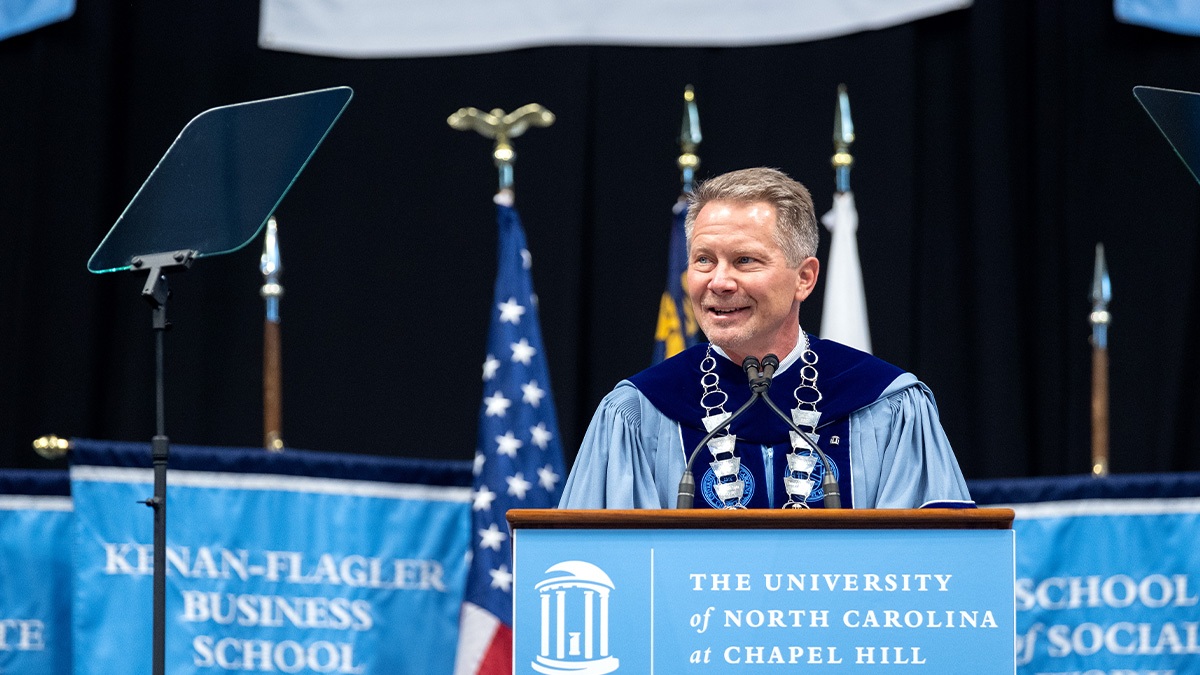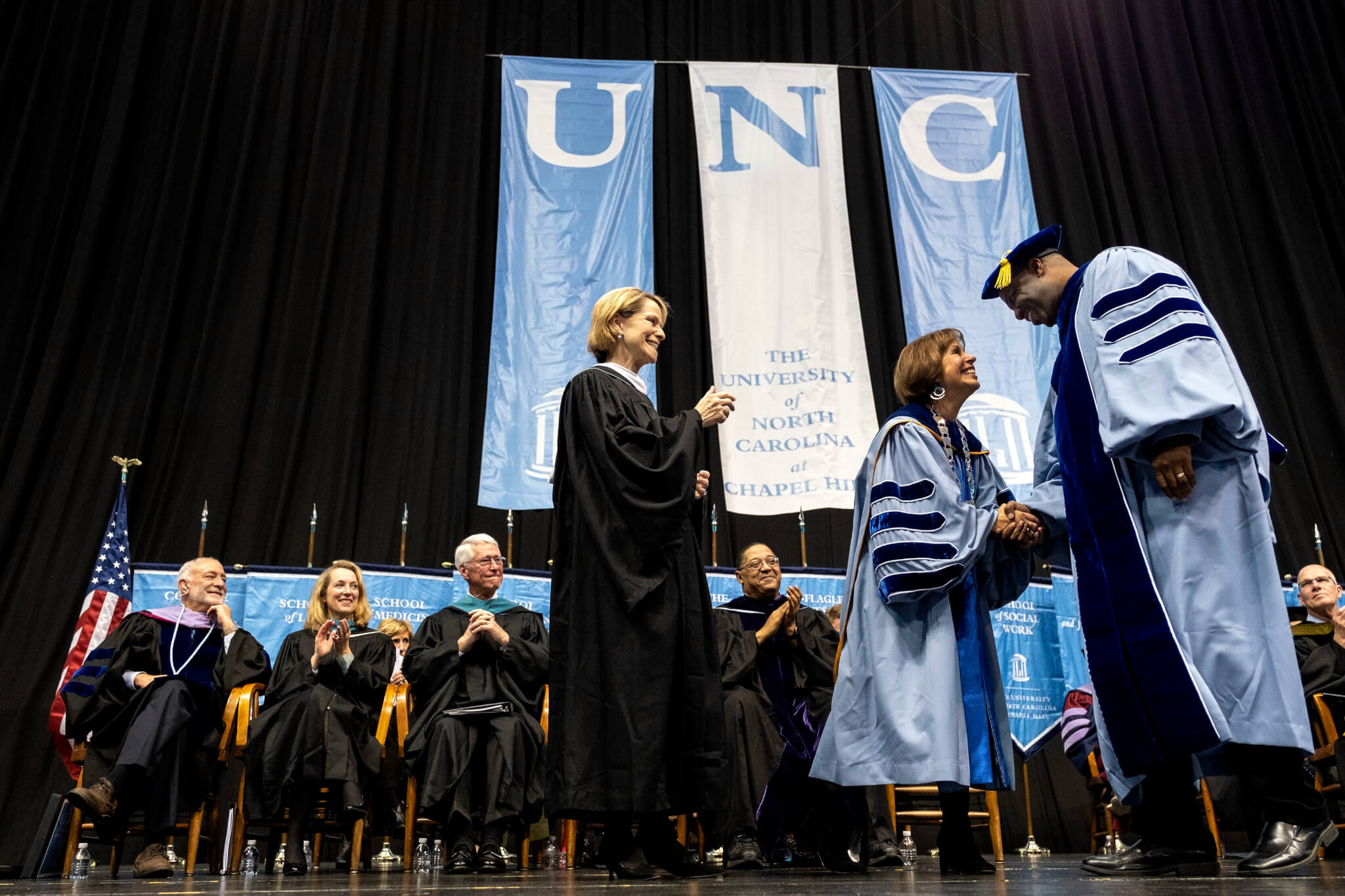Martin Luther King Jr. Celebration Banquet
"We know that to advance we have to be working towards something that matters, something that we stand for, and Dr. King’s beloved community is worth all that we can give to that end."
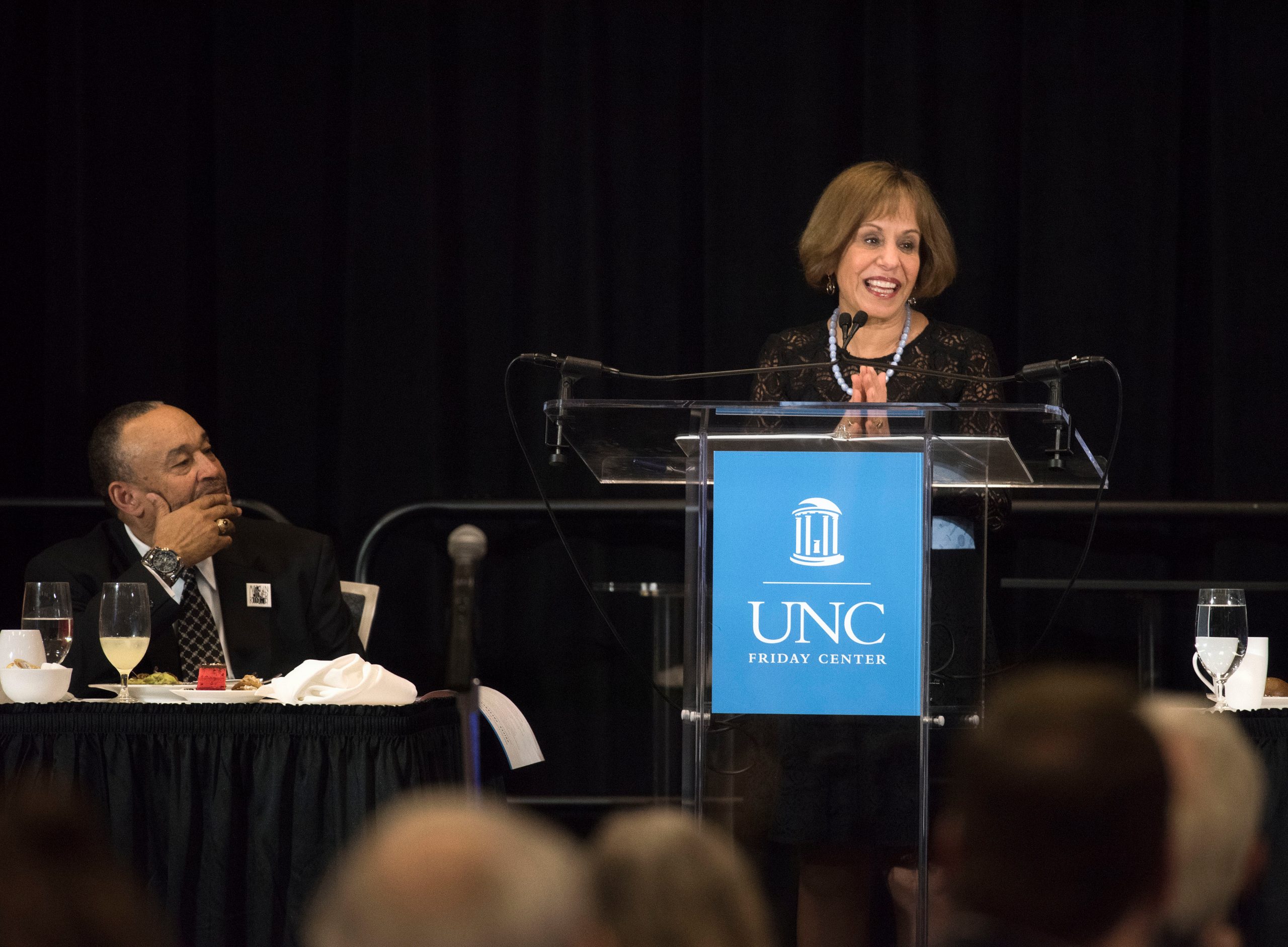
CHANCELLOR CAROL L. FOLT
Remarks to Carolina Community for Martin Luther King Jr. Celebration Banquet
Sunday, January 14, 2018,
UNC Friday Center
CHANCELLOR REMARKS:
Good evening everyone.
I am honored, I’m humbled and I’m excited to greet you today as we are beginning Carolina’s weeklong celebration honoring the legacy of the impact of the Reverend Dr. Martin Luther King Jr. This has been a proud tradition at Carolina for more than 35 years. Our program began before there was a national holiday to honor Dr. King’s legacy. I particularly love that our students are so committed to this celebration and, with the guidance of Dr. Alexander and some help of very talented faculty and staff, they do the lion’s share of the work to create this amazing week filled with events each year. It’s a true labor of love and respect and we thank them so let’s give a big applause to that community.
Today, we are coming together as a community, an aspiring, beloved community, a truly brotherly society, which Dr. King said in 1966, is the truest objective we can seek in life. We come together to celebrate his transformative legacy of meaningful civil action, empowering and beautiful language, and principled human leadership. We use this time to reinforce our own commitment to building the beloved community that he inspired and that we all still seek.
Tonight, I’m looking out at a room of people who dedicate themselves every single day to these cherished goals. I see people from across our community here, including leaders from the Orange County and Chapel Hill boards, state and national legislative, great friends of Carolina from the community. I see people from the University, a great number of my senior leadership team are here, faculty, staff, alumni and students. I want to thank you all, not only for attending this wonderful banquet, but for what you do every single day to make our community stronger, our world better, more equal, safe and invigorating for generations of students to come.
I give special thanks to the MLK University-Community Planning Corporation for their work supporting outstanding local high school students and graduates. Since 1993, this event has helped more than 150 students realize their dreams of a college education and this is such a noble goal. President Barack Obama said it so well, “it is this rising generation, the young and fearless at heart, the most diverse and educated generation in our history, who the nation is now wanting and waiting to follow.”
I was thinking a lot about what I could say standing here tonight, not only as Chancellor, but as the first female chancellor of America’s first public University, and also as a parent, as a scientist, as a teacher, as the granddaughter of immigrants and as a member of this community. Reflecting on the legacy of Dr. King feels especially meaningful to me this year, perhaps because of events that are unfolding across our region, our nation and our world. They are calling out so loudly for our nation to reaffirm its stand for justice, equality, humanity, freedom, hope, civility and democracy.
My own story is a very American story. It’s founded on the American ideal of freedom, democracy and opportunity. My grandparents, as you heard, came from Albania. My grandfather is what we would have called a freedom fighter in the early 1900s, but his side lost terribly, and he emigrated from Albania and helped to build an Albanian community outside Akron, Ohio. The friends and family left behind suffered for decades along with more than one hundred thousand Albanians who were massacred, forced to leave their homes, tortured and raped in the Balkan and other wars. Their lives and struggles were always on my mind growing up. I was taught to believe that America, that democracy, was the light on the hill. It was the only thing that separated us from chaos and injustice. I used to imagine that when my grandmother was coming into New York into the harbor, she probably couldn’t have imagined seeing her granddaughter hold such an amazing position. But now, I actually believe that she could because she truly, truly believed in America and the power of education to open any door.
I know all of you have incredible origin stories about people who believed in you and shared a belief, as did Dr. King, not only in the power of education to improve things, but in the obligation our University has to make those advantages available to everyone. Before I came to Chapel Hill, I wasn’t actually looking for a new job, but Carolina had such an aura… success and commitment to access and affordability… its power as a public research juggernaut… history as the nation’s first public university… and the love expressed for this place by the people here, just pulled me right here.
Five years ago, in my first year, I addressed this room… and in those intervening five years, I’ve learned so much that reaffirms my belief in the power of this community to make positive change. But I’ve also learned much that increases my own sense of urgency and appreciation for the gaps and the needs that we must continue to address together if we truly want to be up above the community. In the next few minutes, I’d like to share some of the events and information that has influenced me in that time.
In late December, we mourned the passing of Leroy Frasier, who with his brother Ralph and John Lewis Brandon, were the first African American undergraduates to enroll in Chapel Hill in 1955 following a court order. Five years later, in 1960, when Dr. King spoke to a standing room only crowd in Hill Hall, there were still only four African American freshmen. In 1966, when Dr. Hortense McClinton became the first African American faculty member and Charley Scott became Carolina’s first scholarship athlete, there were 22 African American first year students in Chapel Hill. In 1965, Karen Parker was the first and only African American undergraduate women to graduate and she did that along with five African American men. Things began to pick up, so that the graduation class of Preston Dobbins and Reggie Hawkins, who founded the Black Student Movement (BSM) here in 1967, had 190 African American graduates. In 1972, when Richard S. Junior became the first African American Student Body President, there were 637 African American students enrolled.
Of course, things have improved markedly since those days. For example, today more black or African American students earn bachelor degrees at UNC than any of the top 30 national universities. The six-year graduation rate for black and African American students is among the highest in the country at 87%, which is 11 percentage points higher than just ten years ago. Black students make up a larger share of all bachelor degree earners at UNC today than they did 25 years ago, but we aren’t satisfied. Just last year, the yield for the percent of the students admitted, the African American students admitted to UNC Chapel Hill, 47% of them accepted our offer. That means that slightly more than half of the students we had hoped would attend chose to go elsewhere. We don’t want to lose any of those amazing students. And so, we have many efforts underway, including fundraising, outreach and a new initiative by the BSM to help recruit them. It’s a very important part of our work going forward.
We have other points of pride. Our medical school has the greatest fraction of African American students of all medical schools in America except for those predominately-black institutions. Our Chancellor Science scholars just received a $10 million gift to increase its reach and to allow us to recruit STEM talent. For nearly 50 years, Project Uplift has helped recruit high school students and seniors from across the state. Our faculty is also much more diverse. In 2017, 15.2% or roughly 1,400 of our faculty were identifying as underrepresented minorities. This ranks at the top of our University peer group of leading public and private universities. A number of our postdoctoral training and target opportunity programs have played a significant role in building the pipeline and attracting top talent. Over the last decade, when faculty growth at UNC Chapel Hill has slowed to less than one percent a year, the number of African American faculty at tenure time alone has increased by 15% and we’ve seen a 33% increase in all faculty.
Still this isn’t close to what we hope to achieve. It’s a good start, but it’s not where we want to be and with the small numbers, we have and low overall rates of growth, the loss of any faculty member via failed retention or retirement leaves a hole in the fabric of our community. We know we have more work to do, and even as we celebrate the accomplishments, we have to look for ways of doing more. I truly believe that commitment to diversity is a commitment to the success and the humanity of every person. I know from my own personal experience as a scientist and a teacher, that a diverse community is a much richer community with much better ideas, with more innovation and with increased empathy and respect. If we can return to Dr. King’s compelling vision of a beloved community, I can’t really imagine anything that is more critical to building an academic, a learning community than bridging the divides that are caused throughout history by socioeconomic status over racial and ethnic identity, prejudice or mistrust.
I believe there’s nothing more important than working towards these goals right now, right here in Chapel Hill with all of you. One of the things we do very well and where we’re maybe the best in the nation is to provide an excellent and affordable education and to make coming and succeeding here not a matter of wealth or identity, but capacity of determination. At least that is what we seek to do. Programs like Carolina Covenant or the C-STEP Program or the Carolina Advising Corps or our Minority Postdoc Program or our Science Scholars are recognized across the nation because of their leadership. We just announced the goals of Carolina’s most historic and largest capital campaign. We’re seeking to raise a staggering number, $4.2 billion, which includes a goal of $1 billion for aid and scholarships to ensure our university can continue to be America’s leader in access, affordability and value. A magazine interviewed me recently and they looked at that number and where we are going and they said… “Whoa, $1 billion in student aid.” They really could not believe that, especially at a public university. They asked, do I really think that Carolina can raise such a sum? I absolutely believe it. I believe that we’re going to surpass it. In fact, we’ve already raise more than $300 million towards it, but I believe it’s going to be possible because a belief in the opportunity for all is at the core of our community’s belief about itself and I think we’re going to get there. I believe we’ll surpass it.
I know that in bridging community and university, we have a responsibility also to be a good neighbor to our local community and our state and our country. I see this every day in our faculty and our students who do almost 100,000 hours of community service… That’s millions of dollars’ worth of service and community engagement. I can see it in programs like the Northside Neighborhood Initiative and in our free healthcare, dental and legal clinics and in our community-based arts and science programs at our museums and at the planetarium. I see it every day in the willingness of our people to look deeply into our own history and our own past and at the same time use that to plan for the future.
We honor the legacy of Dr. King today, his perseverance and his sacrifice and it makes me think a lot about Carolina’s own heroes, the people who struggled to make this University and community the place it is today. These are people who persevere, day in and day out, in recent years behind the scenes and in earlier years, many as enslaved peoples without rights or recognition. It was Dr. King who said, “Human progress is neither automatic, nor inevitable. Every step towards the goal of justice requires sacrifice, suffering and struggle, the tireless exertions and passionate concern of dedicated individuals.” When I think about Carolina’s future, I think about how it always comes down to our people, who they are and what they stand for… and I found that big dreams beat in the hearts of everyone that you meet here.
We were founded on big dreams, lux and libertas, light and liberty, education to preserve democracy, but of course not everyone was included in that founding dream. Like Wilson Caldwell, who was born enslaved to University President David Swain. After emancipation, Caldwell served as Justice of the Peace in Chapel Hill and Town Commissioner during turbulent reconstruction times, eventually returning to work at the University where he was head of the campus workforce until his death in 1898. I really love this: Last year, Carolina students instituted the Wilson Caldwell Day on his birthday, February 27th, to honor and remember him. Another example is Rebecca Clark who joined the University as a maid at the Carolina Inn in 1937 and later worked in the laundry building. She met with President Frank Porter Graham and talked about the working conditions in the laundry. Her activism won wage increases. It brought safer workspaces and more reasonable work schedules for laundry workers. She also became the first licensed practical nurse to work in the campus infirmary and she helped elect Howard Lee who, in 1969, became not only the first African American mayor in Chapel Hill, but also the first African American mayor in any predominantly white city in the South.
Over the years, countless people have pushed for a fairer and more just University community. The Black Student Movement, with its powerful voice, has served Carolina for 50 years. People like our past and present students, faculty, our alumni and administrative leadership, students like graduate student Shelby Dawkins-Law who challenged us at a town hall a couple of years ago to do something to increase the visibility and fully represent our diverse history. This led us to create scholarships in the names of 21 pioneers who we call Carolina’s Firsts. We are now announcing another set of name-based scholarships after people who strengthened our community through their advocacy and their activism and we’re going to call those the Bridge Builders. There is nothing that beats our students, who are holding those name scholarships, and seeing them meet some of the people and the families for whom those scholarships were named.
Our work will not end by naming pioneers. In 2015, when the board of trustees renamed Saunders Hall to Carolina Hall, they also tasked me with developing a plan to share our University’s bold history. At the time, I formed the History Task Force and their first action was to create an incredible exhibit in the lobby of Carolina Hall that explains in a very honest narrative the history of William Saunders and his influence in the state and the nation. As Jim Leloudis, who is a member of our Task Force has said, “This is a University that sits on land that was expropriated from people. It’s a University that was shaped in the era of Jim Crow. These are hard things in our history,” he says, “and complex stories. The basic fact is while both challenging and hurtful to our sensibilities today, if an institution has no sense of its past, its unvarnished past, it has no future.” Barack Obama told us that when we have already achieved, and possess hope, the audacity to hope for what we can and must achieve tomorrow we have achieved much, but there’s still so much more that we can do.
One of the issues from the past that still needs our attention is that Confederate Monument. We are working on a way forward. I’m not satisfied with leaving this issue unsolved, but much as I wish I could I don’t have answers to share with you about that today, but I can’t pretend that it doesn’t exist as something important to everybody here.
In the meantime, my leadership team and I will continue to focus on what we can do. We’ll continue to do the critical work to strengthen the diversity and the success of our students, our faculty and our staff… continue to build programs to foster inclusion… continue to strive to build a University that drives innovation and research that changes lives… continue to raise funds for all that aspire to accomplish here and across the state and nation. In the past few months, I have been especially aided by Dr. Alexander, Vice Chancellor Felicia Washington and Vice Chancellor Winston Crisp as we’ve tried to go out and listen to virtually every single person who wants to talk about their feelings and experiences regarding not only the Confederate Monument, but also their experience as members of this community. We have been so moved by the honesty and the courage of those who have told us how they felt, or how their friends in their community feel, as they continue to struggle with divisive rhetoric both here and across the nation.
As Michelle Obama says, we have got a responsibility to live up to the legacy of those wonderful people who came before us to by doing all that we can to help those who come after us. Those are words to live by. We know that to advance we have to be working towards something that matters, something that we stand for and Dr. King’s beloved community is worth all that we can give to that end. I believe our success will come from people’s hearts. When I look out at the 4,000 plus students, I see at each convocation, I know that every single one of them has an amazing story and has a dream. They light up so brightly when they share their passions, or when they talk about the changes that they want to see and when they express clear determination to be part of making something important happen. As a University, we can do many, many things, but in the end, our achievement will be about our community’s feelings, their human feelings, their beliefs and their hopes. We need to take care of that precious trust of our people by supporting them, so they can accomplish great things. We need to build a community, a just community for them all.
My grandparent’s village in Albania is so off the grid that even today, and I was there just a couple years ago, you can see donkey carts along the very old cars on the bumpy village road. My grandmother had belief, she had hope and determination, she knew what it meant to work really hard and I learned from her that no dream was too big and that you should never ever stop trying. After she died, I was going through her things and I found a series of poems that she had been copying out over and over in her wobbly hand in English. At almost 90 years old, she had been in America for almost 60 years, and she was still trying to improve her English. Now that’s the living proof of perseverance and never giving up. I think of her often in times of trouble.
Mae Jemison, the first African American women to travel in space famously said, “Never be limited by other peoples limited imagination.” That holds true for all of us here tonight. If we can imagine a better community, if we can see that we’re stronger together than we are apart, if we can do every single thing we individually can do to make opportunity for all our reality, if we can keep our own hearts open and not shut down in the face of dissent, we can truly shine a light on the state and the nation. We can help create a beloved community we call home. Thank you.
